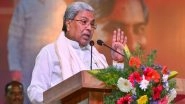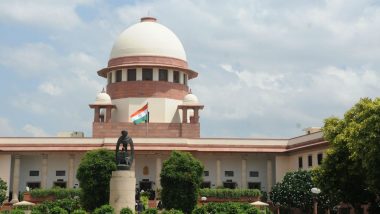New Delhi, June 29: Taking note of basic global concept on food security, the Supreme Court Tuesday said in that the absence of explicit provision for it, the fundamental right to life under Article 21 of the Constitution may be interpreted to include the right to live with human dignity, having right to food and other basic necessities.
“The Right to Life as guaranteed by Article 21...gives the right to every human being to live a life of dignity with access to at-least bare necessities of life. To provide food security to impoverished persons is the bounden duty of all States and Governments,” the top court observed while issuing a slew of directions on a plea of three activists. ICAI CA Exams 2021 Update: Supreme Court to Not Pass Directions to Postpone Examinations.
The activists -- Anjali Bharadwaj, Harsh Mander and Jagdeep Chhokar -- had sought implementation of welfare measures for migrant workers who faced distress again due to curfews and lockdowns in various parts of the country during the second wave of COVID-19.
“There has been worldwide awareness regarding the right to food for human beings. Our country is no exception. Lately, all Governments have been taking steps and taking measures to ensure that no human being should be affected by hunger and no one dies out of hunger. The basic concept of food security globally is to ensure that all people, at all times, should get access to the basic food for their active and healthy life.
"The Constitution of India does not have any explicit provision regarding the right to food. The fundamental right to life enshrined in Article 21 of the Constitution may be interpreted to include the right to live with human dignity, which may include the right to food and other basic necessities,” held a bench of justices Ashok Bhushan and M R Shah.
The top court, in its 80-page judgement, referred to the National Statistics Office (NSO) data of 2017-2018 and said there are around 38 crore workers engaged in the unorganized sectors and to provide food security to them is the duty of the government.
“Thus, the number of persons in the unorganized sector is more than 1/4th population of the entire country. These unorganized workers did not have any permanent source of employment and have engaged themselves in small time vocations and occupations at various places away from their native places.
Contributions of these labourers towards different projects, industries, make considerable additions in the economic development of the country,” it said. The Constitution enjoins that the control of resources of the community are for promoting welfare of people by securing social and economic justice to the weaker section, it said.
It acknowledged the fact that migrant workers had been exposed to financial and other hardships during the pandemic due to their limited access and claim to the welfare resources offered by states and union territories (UTs).
”When migrant labourers form more than 1/4th population of the country, all
Governments or authorities have to take special care regarding welfare of these migrant workers/labourers. The Parliament has enacted various legislations to safeguard the interest and welfare of the migrant labourers, which we shall notice hereinafter,” it said.
Holding that states are duty-bound to provide food security to poor people, the bench said Parliament with an objective to provide such a security had enacted the National Food Security Act, 2013.
“The Central Government may undertake exercise under Section 9 of the National Food Security Act, 2013 to re-determine the total number of persons to be covered under the Rural and Urban areas of the State,” the top court said in the judgement.
(The above story is verified and authored by Press Trust of India (PTI) staff. PTI, India’s premier news agency, employs more than 400 journalists and 500 stringers to cover almost every district and small town in India.. The views appearing in the above post do not reflect the opinions of LatestLY)













 Quickly
Quickly


